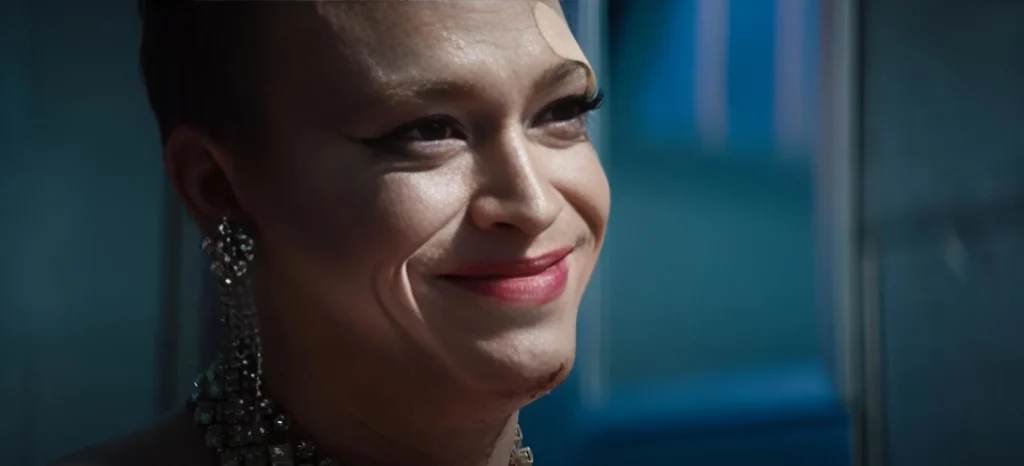As always, on Thursdays, cinemas featured the latest releases, among which was the new film by Luc Besson, “Dogman.” This dramatic thriller was part of the main competition program at last year’s Venice Film Festival and received mostly negative reviews with conflicting opinions from critics. In the review below, we’ll discuss the specific points of controversy and the film it is persistently compared to, by the French director.
Dogman
Genre: Drama, Thriller, Action
Director: Luc Besson
Starring: Caleb Landry Jones, Jojo T. Gibbs, Christopher Denham, Clemens Schick, Grace Palmer, Marisa Berenson
Theatrical Release: [Premiere date not specified]
Year of Release: 2023
IMDb Rating: 6.7

It was a rainy summer night. The red light from the van’s taillights gracefully slid on the wet asphalt of the highway. It was pouring. A police officer stopped the vehicle and asked the driver for license and registration. However, behind the wheel was not an ordinary tired traveler but a much more extravagant personality — a suspicious and slightly eccentric man in the guise of Marilyn Monroe. In addition to other oddities, the police found a pack of dogs inside the van. The dubious driver is detained.
In the middle of that same restless night, psychiatrist Evelyn receives a phone call at her home. She is called to work to talk to the detained young man in a wheelchair, as law enforcement doesn’t know what to do with him. Arriving at the cell, Evelyn learns all the details of the incredibly articulate interlocutor’s life, Douglas, including his tragic childhood, unrequited love, and an exceptionally strong connection with dogs.
Luc Besson, the tireless creator of whimsical stories, whether about lonely hearts or dangerous women of model appearance, less often — journeys into Hollywood-scale fantastic worlds, once again presents to the film world a work with highly controversial qualities. His “Dogman” seems to pretend to be a gloomy pseudo-comic about another marginal and screaming social inequality. Essentially, it is an origin story of a character with certain physical impairments and artistic (super)abilities, condemned to rejection by a cruel world and constant suffering. Seen it, know it.
Not without reason, the film is compared to Todd Phillips’ “Joker” by everyone who cares. However, these comparisons seem clearly complimentary compared to Besson’s creation and sound too loud.
Despite the apparent similarity of characters, “Dogman” lacks the narrative coherence of its predecessor, inspired by Scorsese’s works. The script here is purely Bessonian, ruthless, and peculiar. And the Frenchman, as is known, has not been in his best form for a long time. Accepting screen absurdity with utmost seriousness is impossible a priori. And here comes Caleb Landry Jones, performing with such confidence and depth that you have to see it at least for him.
From the debut flashbacks, coming to terms with one-dimensional degenerate rednecks is not easy but quite possible. Under the mournful soundtrack, they put a child in a cage with dogs, and everything seems so hopeless that it’s almost wolfish. And with Besson, thanks to him, someone in French cinema is once again put on a chain, let’s remember at least “The Messenger: The Story of Joan of Arc” by Luc Besson.
The problem is that these hyperbolized sufferings are diluted, for example, with the counterpoint of cheerful Eurythmics, a rudimentary segment about a robbery, almost a caricature culmination borrowed from somewhere in the Christmas classics with Macaulay Culkin. Just add some dogs.
Besson’s new film can be taken as sheer bad taste, although it is only partially so. It is much harder to grasp what is truly worth attention. First and foremost, it’s the presence of Caleb Landry Jones, who is equally stunning as a drag queen portraying Edith Piaf or Marlene Dietrich and as a modest guy confessing to a police psychiatrist.
Moreover, reducing the cringe level in the blood will help a full realization of whose film is currently before your eyes. The dialogue scenes between Doug and the psychiatrist are interesting enough. The bright image of “Marilyn Monroe with an advantage” is saved for dessert. There’s even a Milo of its own.
The film is worth watching only if you are prepared for it. Prepared for dogs reading Shakespeare and police officers, of course, eating their donuts (what else). For the bandits to turn out to be catastrophically helpless, but that’s not even important because the local plot barely pulls the action; all the excitement is in the trailer. In the end, I repeat, you need to understand that this is a late Luc Besson project, with all the consequences.
In conclusion:
“Dogman” is far from the most outstanding examples of Luc Besson’s cinema from the 90s but much better than the director’s previous work, “Anna,” which did not turn out to be a distinct genre film but provided a place for Russian actors in the frame.